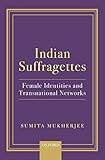Indian suffragettes : female identities and transnational networks
By: Mukherjee, Sumita.
Publisher: New Delhi Oxford University Press 2018Description: xv,291p.ISBN: 9780199484218.Subject(s): Women--Identity -- Suffragists -- Women--Social conditions -- IndiaDDC classification: 324.6230954 Summary: This book describes folk performances reflect the life-worlds of a vast section of subaltern communities in India. What is the philosophy that drives these performances, the vision that enables as well as enslaves these communities to present what they feel, think, imagine, and want to see? Can such performances challenge social hierarchies and ensure justice in a caste-ridden society? In Cultural Labour, the author studies Abhiyan puja (landworship), bides (theatre of migrant labourers), Reshma-Chuharmal (Dalit ballads), dugola (singing duels) from BiPopular depictions of campaigns for women’s suffrage in films and literature have invariably focused on Western suffrage movements. The fact that Indian women built up a vibrant suffrage movement in the twentieth century has been largely neglected. The Indian ‘suffragettes’ were not only actively involved in campaigns within the Indian subcontinent, they also travelled to Britain, America, Europe, and elsewhere, taking part in transnational discourses on feminism, democracy, and suffrage. Indian Suffragettes focuses on the different geographical spaces in which Indian women were operating. Covering the period from the 1910s until 1950, it shows how Indian women campaigning for suffrage positioned themselves within an imperial system and invoked various identities, whether regional, national, imperial, or international, in the context of debates about the vote. Significantly, this volume analyses how the global connections that were forged influenced social and political change in the Indian subcontinent, highlighting Indian mobility at a time when they were colonial subjects. har, and the songs and performances of Gaddar, who was associated with Jana Natya Mandali, Telangana: he examines various ways in which meanings and behaviour are engendered in communities through rituals, theatre, and enactments. Focusing on various motifs of landscape, materiality, and performance, the author looks at the relationship between culture and labour in its immediate contexts. Based on an extensive ethnography and the author’s own life experience as a member of such a community, the book offers a new conceptual framework to understand the politics and aesthetics of folk performance in the light of contemporary theories of theatre and performance studies.| Item type | Current location | Call number | Status | Date due | Barcode |
|---|---|---|---|---|---|
 Books
Books
|
NASSDOC Library | 324.6230954 IND- (Browse shelf) | Available | 50927 |
Include Bibliography and Index
This book describes folk performances reflect the life-worlds of a vast section of subaltern communities in India. What is the philosophy that drives these performances, the vision that enables as well as enslaves these communities to present what they feel, think, imagine, and want to see? Can such performances challenge social hierarchies and ensure justice in a caste-ridden society? In Cultural Labour, the author studies Abhiyan puja (landworship), bides (theatre of migrant labourers), Reshma-Chuharmal (Dalit ballads), dugola (singing duels) from BiPopular depictions of campaigns for women’s suffrage in films and literature have invariably focused on Western suffrage movements. The fact that Indian women built up a vibrant suffrage movement in the twentieth century has been largely neglected. The Indian ‘suffragettes’ were not only actively involved in campaigns within the Indian subcontinent, they also travelled to Britain, America, Europe, and elsewhere, taking part in transnational discourses on feminism, democracy, and suffrage. Indian Suffragettes focuses on the different geographical spaces in which Indian women were operating. Covering the period from the 1910s until 1950, it shows how Indian women campaigning for suffrage positioned themselves within an imperial system and invoked various identities, whether regional, national, imperial, or international, in the context of debates about the vote. Significantly, this volume analyses how the global connections that were forged influenced social and political change in the Indian subcontinent, highlighting Indian mobility at a time when they were colonial subjects. har, and the songs and performances of Gaddar, who was associated with Jana Natya Mandali, Telangana: he examines various ways in which meanings and behaviour are engendered in communities through rituals, theatre, and enactments. Focusing on various motifs of landscape, materiality, and performance, the author looks at the relationship between culture and labour in its immediate contexts. Based on an extensive ethnography and the author’s own life experience as a member of such a community, the book offers a new conceptual framework to understand the politics and aesthetics of folk performance in the light of contemporary theories of theatre and performance studies.


There are no comments for this item.